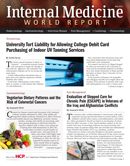Publication
Article
NSEPs are an Asset to Communities in Reducing HIV Spread
Author(s):
Needle and syringe exchange programs are valuable to communities looking to reduce the spread of injection related HIV and should be rebuilt around the country, according to an editorial published in JAMA.

Legislation to expand and extend the state of Indiana’s needle and syringe exchange program (NSEP) program would be largely beneficial, according to an opinion published in JAMA.
The authors, from Brown University, wrote that the need to prevent injection related human immunodeficiency virus (HIV) transmission is pressing due to the country’s current opioid dependence and prescription misuse. Indiana Governor Mike Pence issued an executive order in March of this year, which declared a state of public health emergency. In the order, he authorized a then outlawed renewable 30-day NSEP in order to reduce the spread of HIV within the state.
There were 153 HIV cases over the span of 2 months, mostly due to intravenous use of a liquefied form of opioid agonist oxymorphone (a Schedule II controlled substance), which is sold on the market as an extended release tablet (Opana). The authors noted that both methamphetamine and heroin were implicated as well.
Governor Pence’s order decriminalized the possession and distribution of sterile syringes, overriding 3 state laws in the process. In 1988, a federal law passed banning the funding of NSEPs — it was repealed in 2010 and 2011, though reinstated in 2012. There are 23 states, including, Indiana that criminalized the distribution or possession of syringes for illegal drug use through drug paraphernalia, syringe prescription, controlled substances, and pharmacy laws.
The editorialists continued that only 16 states authorized NSEPs, suggesting that overall, NSEPs have been essentially federally banned for the past 30 years. States that have adopted NSEPs, like Washington in 1988 and New York in 1992, have seen declines in their rates of injection related HIV.
The Brown authors continued by outlining the arguments against NSEPs — most commonly, that the practice indicates the government condones and perpetuates drug use and crime. Still others believe NSEPs can assist those who seek help. And in the case of Governor Pence, the authors write, Indiana on the whole is an opponent to NSEPs. Governor Pence said he was making an exception to his “long standing opposition to needle exchange programs.”
“What happened in Indiana was predictable and avoidable,” the authors opined. “Ranked 47th in health program funding and delayed in the expansion of its Medicaid program pursuant to the Affordable Care Act, Indiana has been hard pressed to extend basic health care services and reduce its uninsured rates. Scott County, the epicenter of the current epidemic, has recently been rated last in the state on health outcomes. Scott County has a long history of unemployment, poverty, and generational addiction. In addition, Scott County has been without an HIV testing center since early 2013.”
NSEPs are beneficial because they are not limited to sterile hypodermic needle disposal; these programs offer counseling, testing, and treatment for patients with HIV and related diseases, hepatitis, tuberculosis, and sexually transmitted infections. These factors contribute to a reduction in the spread of HIV and related diseases and can facilitate treatment of drug abusers, the authors said.
Indiana should rebuild its public health and social services, because what happened in this area can and will happen elsewhere, according to the authors.
“Failure to act would constitute a tragic and costly opportunity missed,” they concluded.





